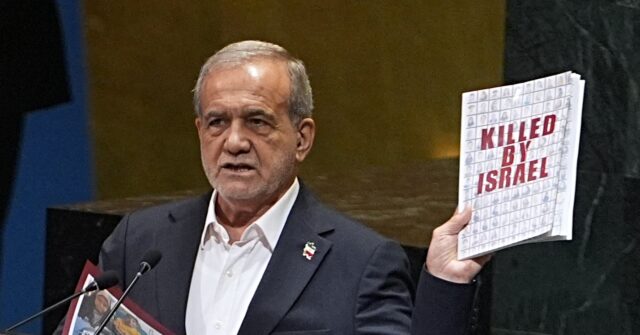Iranian President Mahmoud Pezeshkian, who is subservient to “supreme leader” Ayatollah Ali Khamenei, spent much of his Wednesday meeting with European leaders, pressuring them not to implement “snapback” measures that would restore sanctions on his country over its illicit nuclear development.
Iran, the world’s premier state sponsor of terrorism, has alarmed the world with a dramatic increase in nuclear development activities, particularly nuclear enrichment. The International Atomic Energy Agency (IAEA) passed a resolution condemning Iran in June for violating its international law commitments with its uranium enrichment, the first time in 20 years the U.N. nuclear agency had done so.
Since then, the remaining members of the 2015 Joint Comprehensive Plan of Action (JCPOA), known commonly as the Obama-era Iran nuclear deal, have begun the process of reimplementing sanctions on Iran lifted by the JCPOA. The “snapback” provisions in the agreement allow for the restoration of such sanctions in the event that Iran violated the provisions of the agreement.
The JCPOA was originally signed by Iran, the United Kingdom, France, Russia, China and Germany, in addition to the United States. President Donald Trump withdrew America from the deal in 2018, citing Iran’s repeated violations of the agreement. The remaining European parties are those reportedly beginning the process to restore sanctions. On August 18, the parties began the snapback process, which would automatically reimpose those sanctions a month later. Should no negotiations occur to lift the sanctions again and extend the JCPOA, the 2015 deal will expire on October 18.
Iranian state media reported extensively on Pezeshkian’s meetings with various European leaders, many of them not parties to the JCPOA, and his lobbying for them to pressure the relevant countries not to sanction Iran. In multiple meetings at the United Nations in New York, Pezeshkian reportedly made the case that any dialogue with European states would not be “meaningful” if the snapback sanctions return and Iran faces consequences for its actions.
RELATED — Hegseth: Iran Is Trying to Save Face After Being Decimated by U.S.
“We welcome diplomatic talks to resolve the [nuclear] issue, but naturally, if the snapback [mechanism of sanctions] is activated, dialogue will no longer be meaningful,” Pezeshkian told Swiss President Karin Keller-Sutter on Wednesday, for example, according to the Iranian propaganda outlet PressTV.
“Iran is ready to have this issue verified within the framework of international laws and its rights,” he allegedly added. Separately, in a meeting with European Union bureaucrat António Costa, Pezeshkian said that “Tehran is ready for dialogue and understanding to resolve issues and remove obstacles and concerns with the aim of preventing the escalation of differences.” He reportedly blamed any threat to the JCPOA on “those who failed to honor their obligations as per the JCPOA and withdrew from the deal,” presumably referring to Trump.
The Iranian Tasnim News Agency similarly reported on Pezeshkian’s remarks in a bilateral meeting with Norwegian Prime Minister Jonas Gahr Store, another European country not party to the JCPOA.
“Pezeshkian emphasized that if the snapback mechanism is triggered, negotiations would lose their significance,” Tasnim reported. “He stated that Western countries should demonstrate their commitment to their obligations for any meaningful understanding to emerge, adding that the current situation has arisen due to the West’s failure to uphold its commitments under the 2015 nuclear deal.”
Any concerns about Iran’s illicit uranium enrichment, he reportedly added, was the product of “misleading propaganda from the Israeli regime,” without elaborating.
In reality, concerns about Iran’s uranium enrichment are the product of extensive attempts by the IAEA to oversee the Islamist regime’s activities. IAEA Director-General Rafael Grossi publicly protested Iran’s intransigence in working with his agency for months, culminating in a report to the IAEA’s board in June in which Grossi revealed that Iran was actively blocking the agency’s work.
“Unfortunately, Iran has repeatedly either not answered, or not provided technically credible answers to, the Agency’s questions. It has also sought to sanitize the locations, which has impeded Agency verification activities,” he revealed, referring to sites where Iran was engaging in nuclear research.
The sites, he concluded, were likely “part of an undeclared structured nuclear program carried out by Iran until the early 2000s and that some activities used undeclared nuclear material.”
“Arising from this, the Agency also concludes that Iran did not declare nuclear material and nuclear-related activities at these three undeclared locations in Iran,” he added. “As a consequence of this, the Agency is not in a position to determine whether the related nuclear material is still outside of safeguards.”
Grossi’s report prompted the IAEA to pass a resolution condemning Iran and finding it in breach of international law that week. Only three Iranian-allied countries – Russia, China, and Burkina Faso – voted against the resolution. The snapback measure restoration actions are also a response to this resolution.
Outside of bilateral meetings with other world leaders, Pezeshkian took the podium at the General Assembly on Wednesday, claiming that Iran “will never seek to build a nuclear bomb” and condemning any parties seeking to limit Iran’s nuclear development. Tehran has never offered a clear explanation for why it needs to enrich uranium at volumes far higher than what is necessary for a civilian energy program.
“We, the upright people of Iran, by standing firm against lawless marauders, have surmounted with honor the injustices, discriminations, and double standards imposed upon us,” he said. “And today, with an opportunity-oriented outlook, we have transformed this historic achievement of the Iranian people into a platform for a leap toward a hopeful future.”
Follow Frances Martel on Facebook and Twitter.
Read the full article here
